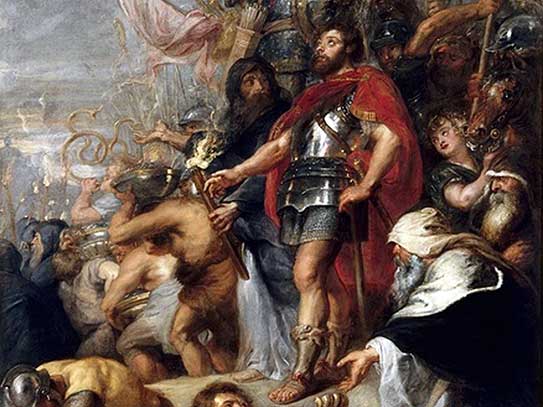The Story of Hanukka

Around 200 BCE Jews lived as an autonomous people in the land of Israel, which at this time was controlled by the Seleucid King of Syria. The Jewish people paid taxes to Syria and accepted its legal authority, and by and large were free to follow their own faith, maintain their own jobs, and engage in trade.
By 180 BCE Antiochus IV Epiphanes ascended to the Seleucid throne. At first little changed, but under his reign Jews were gradually forced to violate the precepts of their faith. Jews rebelled at having to do this. Under the reign of Antiochus IV, the Temple in Jerusalem was looted, Jews were massacred, and Judaism was effectively outlawed.
In 167 BCE Antiochus ordered an altar to Zeus erected in the Temple. Mattathias, a Jewish priest, and his five sons John, Simon, Eleazar, Jonathan, and Judah led a rebellion against Antiochus. Judah became known as Judah Maccabe (Judah The Hammer). By 166 BCE Mattathias had died, and Judah took his place as leader. By 165 BCE the Jewish revolt against the Seleucid monarchy was successful. The Temple was liberated and rededicated.
The festival of Chanukah was instituted by Judah Maccabee and his brothers to celebrate this event. (1 Macc. iv. 59). After having recovered Jerusalem and the Temple, Judah ordered the Temple to be cleansed, a new altar to be built in place of the polluted one, and new holy vessels to be made. When the fire had been kindled anew upon the altar and the lamps of the candlestick lit, the dedication of the altar was celebrated for eight days amid sacrifices and songs (1 Macc. iv. 36).
A number of historians believe that the reason for the eight day celebration was that the first Chanukah was in effect a belated celebration of the festival of Sukkot, the Feast of Tabernacles (2 Macc. x. 6 and i. 9). During the war the Jews were not able to celebrate Sukkot properly. Sukkot also lasts for eight days, and was a holiday in which the lighting of lamps played a prominent part during the Second Temple period (Suk.v. 2-4). Lights were also kindled in the household, and the popular name of the festival was, therefore, according to Josephus ( Jewish Antiquities xii. 7, § 7) the " Festival of Lights."
In the Talmud
The miracle of Chanukah is referred to in the Talmud, but not in the books of the Maccabees. This holiday marks the defeat of Seleucid forces who had tried to prevent Israel from practising Judaism. Judah Maccabee and his brothers destroyed overwhelming forces, and rededicated the Temple. The eight day festival is marked by the kindling of lights with a special Menorah, called a Chanukiah.
A legend recorded in the Talmud says that after the occupiers had been driven from the Temple, the Maccabees went in to take down the pagan statues and restore the Temple. They discovered that most of the ritual items had been profaned. They sought ritually purified olive oil to light a Menorah to rededicate the Temple. However, they found only enough oil for a single day. They lit this, and went about purifying new oil. Miraculously, that tiny amount of oil burned until new oil could be pressed, eight days. It is for this reason that Jews light a candle each night of the festival.
In the Talmud two customs are presented. It was usual either to display eight lamps on the first night of the festival, and to reduce the number on each successive night, or to begin with one lamp the first night, increasing the number till the eighth night. The followers of Shammai favored the former custom the followers of Hillel advocated the latter (Talmud, tractate Shabbat 21b). Josephus believed that the lights were symbolic of the liberty obtained by the Jews on the day that Chanukah commemorates.
The Talmudic sources (Meg. eodem Meg. Ta'an. 23 compare the different version Pes. R. 2) ascribe the origin of the eight days' festival, with its custom of illuminating the houses, to the miracle said to have occurred at the dedication of the purified Temple. This was that the one small cruse of consecrated oil found unpolluted by the Hasmonean priests when they entered the Temple -- it having been sealed and hidden away -- lasted for eight days until new oil could be prepared for the lamps of the holy candlestick. A legend similar in character, and obviously older in date, is that alluded to in 2 Macc. 1:18 et seq., according to which the relighting of the altar-fire by Nehemiah was due to a miracle which occurred on the twenty-fifth of Kislev, and which appears to be given as the reason for the selection of the same date for the rededication of the altar by Judah Maccabeus.
Chronology
198 BCE: Armies of the Seleucid King Antiochus III (Antiochus the Great) oust Ptolemy V from Judea and Samaria.
180 BCE: Antiochus IV (Epiphanes) ascends the Seleucid throne.
168 BCE: Under the reign of Antiochus IV, the Temple is looted, Jews are massacred, and Judaism is outlawed.
167 BCE: Antiochus orders an altar to Zeus erected in the Temple. Mattathias, and his five sons John, Simon, Eleazar, Jonathan, and Judah lead a rebellion against Antiochus. Judah becomes known as Judah Maccabe (Judah The Hammer).
166 BCE: Mattathias dies, and Judah takes his place as leader. The Hasmonean Jewish Kingdom begins It lasts until 63 BCE
165 BCE: The Jewish revolt against the Seleucid monarchy is successful. The Temple is liberated and rededicated (Chanukah).
142 BCE: Establishment of the Second Jewish Commonwealth. The Seleucids recognize Jewish autonomy. The Seleucid kings have a formal overlordship, which the Hasmoneans acknowledged. This inaugurates a period of great geographical expansion, population growth, and religious, cultural and social development.
139 BCE: The Roman Senate recognizes Jewish autonomy.
130 BCE: Antiochus VII besieges Jerusalem, but withdraws.
131 BCE: Antiochus VII dies. Israel throws off Syrian rule completely
96 BCE: An eight year civil war begins.
83 BCE: Consolidation of the Kingdom in territory east of the Jordan River.
63 BCE: The Hasmonean Jewish Kingdom comes to an end due to rivalry between the brothers Aristobulus II and Hyrcanus II, both of whom appeal to Rome to intervene and settle the power struggle on their behalf. Rome moves in and takes control of the whole nation. Twelve thousand Jews are massacred as Romans enter Jerusalem. The Priests of the Temple are struck down at the Altar. Rome annexes Judea.

